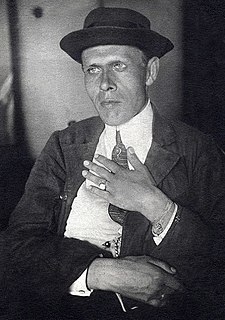A Quote by Max Beerbohm
I have known no man of genius who had not to pay, in some affliction or defect, either physical or spiritual, for what the gods had given him.
Related Quotes
Rincewind shivered. He was not, of course, an atheist; on the Disc the gods dealt severely with atheists. On the few occasions when he had some spare change he had always made a point of dropping a few coppers into a temple coffer, somewhere, on the principle that a man needed all the friends he could get. But usually he didn't bother the Gods, and he hoped the Gods wouldn't bother him. Life was quite complicated enough.
There lived a redheaded man who had no eyes or ears. He didn’t have hair either, so he was called a redhead arbitrarily. He couldn’t talk because he had no mouth. He had no nose either. He didn’t even have arms or legs. He had no stomach, he had no back, he had no spine, and he had no innards at all. He didn’t have anything. So we don’t even know who we’re talking about. It’s better that we don’t talk about him any more.
Old Testament Israel had some foundational pillars of faith. They were true and robust and God given. The trouble was that people had come to trust in them merely by repeating them, without paying any attention to the ethical implications of what their faith should mean in how they lived. They believed God had given them their land. He had. But they had not lived in it in either gratitude or obedience. They had not fulfilled any of the conditions that Deuteronomy had made so clear.
Cuvier had even in his address & manner the character of a superior Man, much general power & eloquence in conversation & great variety of information on scientific as well as popular subjects. I should say of him that he is the most distinguished man of talents I have ever known on the continent: but I doubt if He be entitled to the appellation of a Man of Genius.
It is not every man who can be a Christian, even in a very moderate sense, whatever education you give him. It is a matter of constitution and temperament, after all. He may have to be born again many times. I have known many a man who pretended to be a Christian, in whom it was ridiculous, for he had no genius for it. It is not every man who can be a free man, even.
Illnesses which occur because of physical causes should be treated by doctors with medical remedies; those which are due to spiritual causes disappear through spiritual means. Thus an illness caused by affliction, fear, nervous impressions, will be healed more effectively by spiritual rather than physical treatment. Hence, both kinds of treatment should be followed; they are not contradictory.
There were times when it appeared to Dorian Gray that the whole of history was merely the record of his own life, not as he had lived it in act and circumstand, but as his imagination had created it for him, as it had been in his brain and in his passions. He felt that he had known them all, those strange terrible figures that had passed across the stage of the world and made sin so marvellous, and evil so full of subtlety. It seemed to him that in some mysterious way their lives had been his own.
He walked on without resting. He had a terrible longing for some distraction, but he did not know what to do, what to attempt. A new overwhelming sensation was gaining more and more mastery over him every moment; this was an immeasurable, almost physical, repulsion for everything surrounding him, an obstinate, malignant feeling of hatred. All who met him were loathsome to him - he loathed their faces, their movements, their gestures. If anyone had addressed him, he felt that he might have spat at him or bitten him... .
Everyone had some defect, or body or of mind: he thought of all the people he had known (the whole world was like a sick house and there was no rhyme or reason in it), he saw a long procession, deformed in body, warped in mind, some with illness of the flesh, weak hearts or weak lungs, and some with illness of the spirit, languor of will, or craving for liquor. At that moment he felt a holy compassion for them all. …The words of the dying God crossed his memory: Forgive them, for they know not what they do.



































